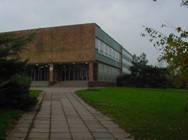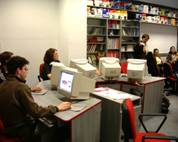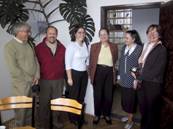Publications | Research | Profiles | Braided Learning Ejournal
ICT - a never-ending challenge in British schools. How do we train staff? How do we ensure standards at key stage 3/4? What makes an effective delivery model which balances discrete IT and ICT in the curriculum? What about the levels and standards of equipment that are needed? What is effective leadership of ICT and so on. Questions often raised, often discussed and always without solution so what do schools in the Czech Republic do to overcome these problems? Through a link with CzechMiranda, three colleagues and I set out over half term to find out.

Our link school, the Arabska Gymnazium, an equivalent grammar school with 15-19 year old intake, explained the Czech educational system to us and how their equivalent of the National Curriculum operates. Essentially the Czech government have prescribed a number of hours of ICT which all students should do and further hours for those taking a special class in Information Technology. We found schools to have a lower level of resources in terms of ratio of PCs to students and found the highest specification to be Windows/Office 2000. All had Internet access operating throughout the day. Students were able to use the computers out of hours, T break and lunch times as well as after school. The levels of achievement from the students in the special classes appeared higher than our own with an emphasis on html coding, java and programming (Visual Basic, C+, C++). The strong mathematical skills of the students we met in all the schools complemented this approach. Both the programming and mathematical skills were seen to be a very important discipline.
Specialist equipment in all schools included multimedia projectors, digital cameras, scanners, laser and colour printers. There was plenty of ICT access for staff in offices. All schools had sophisticated school information systems.
Technical support funded by the Czech education authority was virtually non-existent and schools had no IT co-ordinators. We did not perceive the latter to be a problem since it allowed schools to operate a system of management very similar to the school I work in with the majority of staff perceiving ICT to be a tool for delivery. The Gymnazium F.X.Saldy has all its schemes of work for all departments on-line. Staff produced these. Whilst worksheets were not available to students in an electronic format, revision sheets were. Some staff encouraged students to e-mail work to them but did not electronically mark. On the other hand, the Arabska did have x-curricular worksheets available for students to access in shared folders, which were prepared by the subject teachers. In all the schools, students are actively encouraged to be involved in and run the school website and in one case a very effective publication of a school newspaper.

Some students have computers at home. Internet access was limited in the home environment owing to cost, its very expensive.
Teacher ICT training is in a similar state to our own system. No time allowance given. The schools had a support system in place with one school encouraging staff to study for the ECDL. A timetabled exchange of staff between the gymnasium Arabska and the Czech Technical university ensured continuity for students moving onto Computing courses in FE. However, the Czech authorities did not allow this between teachers in the basic schools and the grammar schools. It seems such an obvious solution to the 'dip in learning' transition problem experienced between UK junior and secondary curricular.
It was clear that, as in the UK, effective leadership and vision for the use of ICT in learning and teaching by the headteacher is essential. We noted a difference in the attitude to learning by the Czech students compared with our own. Subtleties, changing outdoor shoes for indoor shoes, entrusting students in classes before the teacher, access to specialist computers, a more open network environment, the use of Net Meeting, unfiltered access to the Internet, use of school based e-mail, enabled students to become more responsible for their own learning and this I felt, showed in the level of skills achieved in ICT and other subjects such as mathematics, by some students.
We also managed to squeeze in a visit to the Czech Technical University to see how students continued to perform after post 16. Here we were able to explore on-line teaching and witness the use of Net Meeting to deliver lectures as well as preparation for a Programming competition, which is judged automatically by software developed by one of the students in previous years.
I would like to thank Bozena Mannova, CzechMiranda and our hosts at:
Gymnasium F.X.Saldy, Gymnasium Arabska, ZS Vrchlickeho and ZS Cerveny Vrch.

We had a wonderful time, have much to reflect on and even sneaked a look at the wonderful city of Prague!
Carol Webb
[Back]
